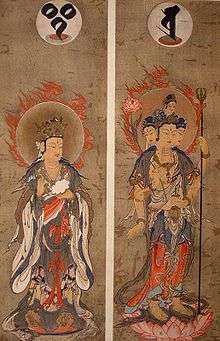Śakra (Buddhism)

| Part of a series on |
| Buddhism |
|---|
 |
|
Śakra (Sanskrit: शक्र; Pali: सक्क Sakka) is the ruler of the Trāyastriṃśa Heaven according to Buddhist cosmology. He is also referred to by the title "Śakra, Lord of the Devas" (Sanskrit: Śakro devānām indraḥ; Pali: Sakko devānaṃ indo).[1] The name Śakra "powerful" as an epithet of Indra is found in several verses of the Rigveda.
In East Asian traditions, Śakra is known as Dìshìtiān (帝釋天) or Shìtí Huányīn (釋提桓因) in Chinese, and also as Taishakuten (帝釈天) in Japan. In China, Śakra is sometimes identified with the Taoist Jade Emperor (Yùhuáng Dàdì 玉皇大帝, often simplified to Yùhuáng 玉皇); both share a birthday on the ninth day of the first lunar month of the Chinese calendar (usually in February).
The Trāyastriṃśa heaven in which Śakra rules is located on the top of Mount Meru, imagined to be the polar center of the physical world, around which the Sun and Moon revolve. Trāyastriṃśa is the highest of the heavens in direct contact with humankind. Like all deities, Śakra is long-lived but mortal. When one Śakra dies, his place is taken by another deity who becomes the new Śakra. Several stories about Śakra are found in the Jataka tales, as well as several suttas.
Śakra is married to Sujā,[2] daughter of the chief of the asuras, Vemacitrin (Pāli Vepacitti). Despite this relationship, a state of war generally exists between the thirty-three gods and the asuras, which Śakra manages to resolve with minimal violence and no loss of life.
Śakra is often depicted in literature as a being who consults the Buddha on matters of morality. Together with Brahmā, he is considered a dharmapala, a protector of Buddhism.
See also
- Haneullim
- Indra
- King of the Gods
- Thagyamin, the Burmese representation of Śakra
- Yuanshi Tianzun, the Taoist counterpart of Śakra
- Zeus
References
Bibliography
- Bhikkhu Analayo (2011). Śakra and the Destruction of Craving – A Case Study in the Role of Śakra in Early Buddhism, The Indian International Journal of Buddhist Studies 12, 157-176
- Buswell, Robert Jr; Lopez, Donald S. Jr., eds. (2013). Princeton Dictionary of Buddhism. Princeton, NJ: Princeton University Press. pp. 739–740. ISBN 9780691157863.
